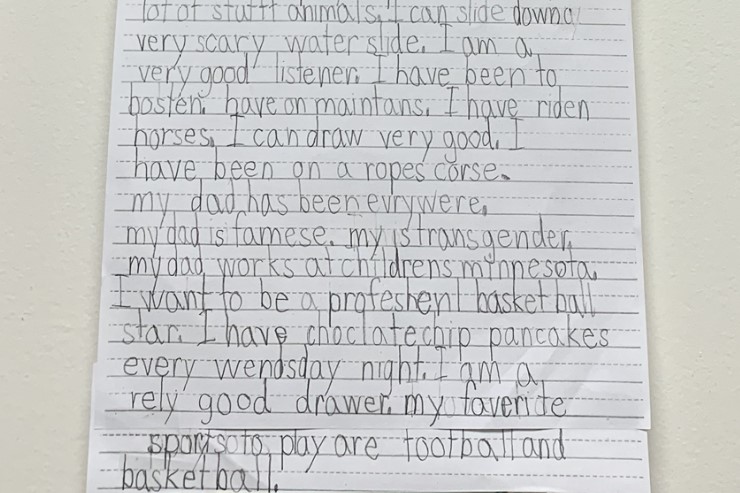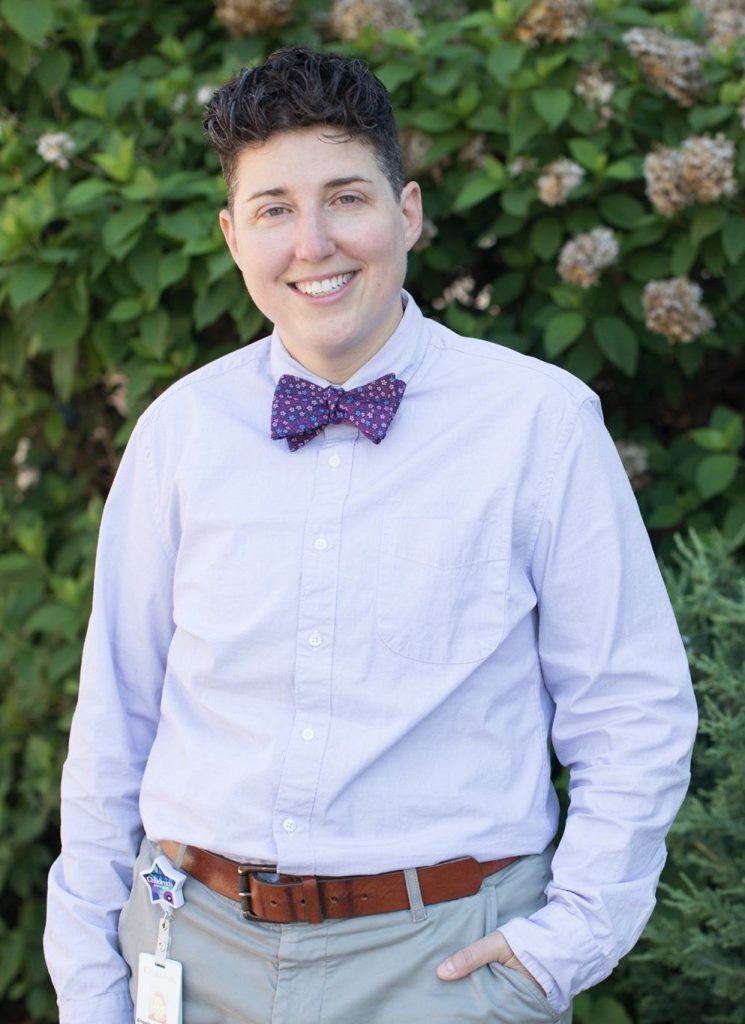
“Are you a mommy or a daddy?” The young child asked me one afternoon as I went to pick up my youngest son from day care. He looked up at me with curiosity, genuinely trying to figure out which of the parenting categories known to him, mommy or daddy, I fit in to. If I had to guess, I looked a lot like a daddy, but I sure sounded more like a mommy. I bent down and smiled at him and said, “I’m not a mommy or a daddy, I’m a Mapa.” “A Mapa?” he asked, “What’s that?” “Well,” I said, “it’s like both a mommy and a daddy, kind of in-between.” “Oh, OK,” he said, contentedly. “Well, then what’s your favorite dinosaur?”
Being Mapa
I am the parent of three kids; my oldest, twins, are about to turn 10, and for the last decade conversations like these, or very similar, have become a part of my everyday existence. My kids have two parents, a mommy (my co-parent) and a Mapa (me). I identify as non-binary and use a non-traditional parenting name to refer to myself, because neither Mom/Mommy nor Dad/Daddy seemed like a fit when my kids were born. When they were little, my kids immediately adapted to this, and have never known me by another name. However, as they grew older, and then entered pre-school, followed by elementary school, having a non-binary or “transparent,” became more challenging for them. Kids would look at them with confusion when they would say “Mapa” because they had no context for parenting designations other than the traditional binary.
My kids didn’t see representation of non-binary or transgender parents in any of the books they read. They would hear other grown-ups tell them to “ask their mom” and then gesture to me. They have been asked by TSA agents when we travel if I am their “mom,” and they look embarrassed and confused because they know what is being asked and don’t want to “get in trouble” but also know that’s not how they refer to me and worry about hurting my feelings. They struggled with school projects for Mother’s Day and Father’s Day because I fit into neither. Do they make me the Father’s Day project? Do they make two Mother’s Day projects?
TransParent Day
As it turns out, there is now an official “TransParent Day,” established in 2009, that honors transgender parents as well as parents who have transgender children. It always falls on the first Sunday of November, which, in 2023, was on Sunday, Nov. 5. While I have always celebrated my honor of being a parent on Father’s Day (my co-parent is celebrated on Mother’s Day), I do think it is significant to mark a parent day of honor for the thousands of parents out there who don’t “fit” into the traditional parenting holidays. In the United States, around 1 in 3 transgender people are parents, which means there are approximately half a million or more parents who identify as transgender or gender non-conforming.
I know what you are thinking. Isn’t Mother’s and Father’s Day enough? Why do we need an additional day? TransParent Day is especially important for transgender parents who may feel isolated or invisible in their communities. It’s a reminder that they are supported, appreciated and accepted for who they are. It’s an opportunity to create a community of support and understanding for transgender parents and their loved ones.
What TransParent Day celebrates
TransParent Day also celebrates the courage and resilience of transgender parents, their families and their children. This day brings attention to the struggles and triumphs that transgender parents face in today’s society. It also serves as a reminder of the importance of advocating for transgender rights, including those related to parenting. Many transgender parents face discrimination from health care providers or other service providers or may even be denied access to certain services due to their gender identity. Additionally, many transgender parents may struggle with finding adequate support systems or resources available specifically tailored to their needs. It is important that these issues are brought into the public eye in order for us to create more inclusive environments for all families.
Trans parents are parents
TransParent Day is also a reminder that transgender parents should not be excluded from conversations about parenting and that they can provide strong, loving and supportive parents to their children. While I may not be a perfect parent by any means, my gender identity has nothing to do with my ability to provide a safe, loving and secure home for my children.
How to support transgender parents
If you are a traditional cisgender parent, what can you do to support the role and journey of the transgender parents in your life? There are surprisingly small and simple steps that you can take to ensure a more inclusive experience for transgender parents AND their children.
- Practice using non-gendered language to refer to other parents when talking to your own children and other children. Instead of saying, “Is that John’s mom?” You could say, “Is that one of John’s parents?” Instead of assuming kids live at home with a mom and a dad, you could ask, “Who are your grown-ups at home?” or “What names to you use to refer to your parents?”
- Make sure your kids are aware of the existence of transgender people and different ways to make a family. Not all families have a mom and a dad, some have two moms, or two dads, or an auntie, or a Mapa.
- When creating and sending out forms or invitations or other printed material, refrain from listing “mom and dad” and list “parents” or “parent/guardian.” Families come in all shapes and sizes and configurations; kids and their grown-ups should not have to struggle to complete simple tasks like filling in an information form or permission slip.
- If possible, avoid assuming that kids have a mom or a dad, or that the person with them is referred to as Mom or Dad. You can ask, “Is this your parent?” or “Who did you bring with you today?” and let the child share their name for their grown-up with you.
Many gifts
Being a transgender parent also brings with it many gifts. For example, my kids seamlessly use pronouns like she, he and they, when referring to their friends or when they don’t know someone’s gender identity. They see and understand a spectrum of identity and love that gives them permission to be their full selves as they grow into teenagers and young adults. They understand the concepts of discrimination and bias in ways that help them be more compassionate friends to their peers and more inclusive members of their communities.
And, as you can see in the photo of my youngest son’s “about me” activity, they have learned adaptations to a world that doesn’t understand “Mapa.” Here, you see him flexibly using “Dad” to refer to me, so his friends understand my role in his life, and he proudly claims my identity to his teacher and his classmates.

To my children, and the many children of transgender and non-binary parents, it is a gift to have parents who live outside the gender binary. I invite you to celebrate transgender parents each November and create safer spaces for them and their kids throughout the year.
Additional resources for you to learn more

Dr. Kade Goepferd, (they/them)
Chief education officer and medical director of the Gender Health program
Dr. Kade Goepferd, (they/them), is the chief education officer, pediatrician and medical director of the Gender Health program at Children’s Minnesota. Dr. Goepferd is an advocate for advancing equitable health care for all children – including trans and gender-diverse youth. They have been named a Top Doctor by both Minneapolis/St. Paul Magazine and Minnesota Monthly for the last several years and gave their first TED talk, “The Revolutionary Truth about Kids and Gender Identity” at TEDx Minneapolis in 2020.
Follow me on Twitter, LinkedIn and Instagram.